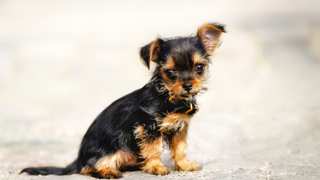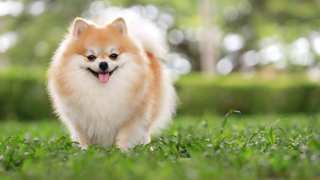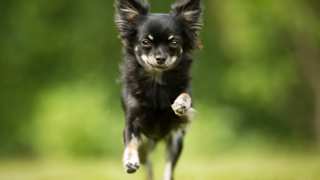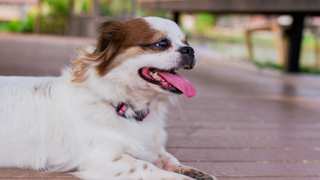Like all breeds, Pomchis will need a diet that includes plenty of animal proteins and carbohydrates for energy, vitamins and minerals for digestive and immune health, and omega fatty acids for coat and skin wellness. This means that the best Pomchi food is the premium dry kind, particularly food that's formulated for small breeds. These high-quality foods, while more expensive and difficult to obtain, have balanced portions of the above-listed ingredients that will sustain your Pomchi's health. Cheap, generic foods are not recommended for these dogs because they contain mostly empty "filler" ingredients that simply don't give the dog the nutrients it needs in the long term. Blue Buffalo, Royal Canin, and Hill's Science Diet are three premium brands that carry excellent small-breed formulas.
And specifically how much dog food does a Pomchi need each day? The short answer: not much at all. The typical adult Pomchi will only need about ½ cup of premium dry food per day, divided into two meals. A Pomchi puppy will need even less: depending on the pup's age, only about 0.3-0.4 cups per day will suffice. So until about six months of age, a few pieces of dry kibble three times a day will be plenty. For more details on feeding your Pomchi from puppyhood through maturity, see the chart below.
Also worth noting is that Pomchis can have dental issues (including tooth decay and loss) they inherit from their Pomeranian parents. In addition to dry kibble, which helps clean the teeth when chewed, owners can give their Pomchis dental dog treats that promote dental hygiene. (Checkups Treats is a popular example.)
Dog AgeDog WeightFood TypeAmountFrequency6 Weeks1 lbDry (Small-Breed formula)2-3 pieces3x/day3 Months2 lbsDry4-6 pieces3x/day6 Months4 lbsDry8-10 pieces3x/day9 Months6 lbsDry0.25 cups2x/day12 Months+7 lbsDry0.25 cups2x/dayIf possible, try to stick to the above-listed portions. Pomchis have surprisingly big appetites for their tiny size, and will overeat if given the chance--which will easily lead to obesity in this crossbreed. A fat Pomchi will have joint, breathing, and digestive issues, not to mention a shortened lifespan. You can help control your Pomchi's weight by having a regular feeding schedule, by not feeding the dog table scraps and other "human" food, and by not leaving food in the dog's bowl all the time, thereby allowing it to eat anytime it wants. It's better to put your Pomchi's bowl down only at mealtimes, then pick it up a few minutes after the dog begins eating.
If you're worried your Pomchi is overweight, give the dog this simple test: run a hand along its side, and if you can't feel any ribs, it's diet time. Reduce your Pomchi's daily food consumption a bit, and add an extra walk or play period to its daily exercise schedule.




